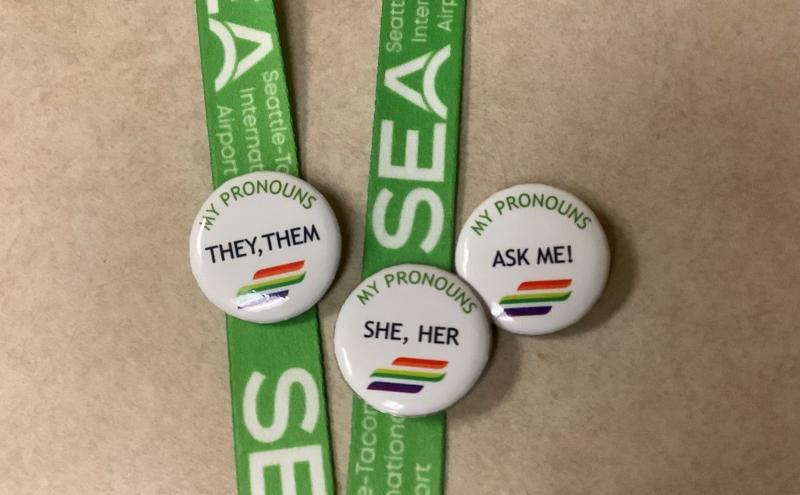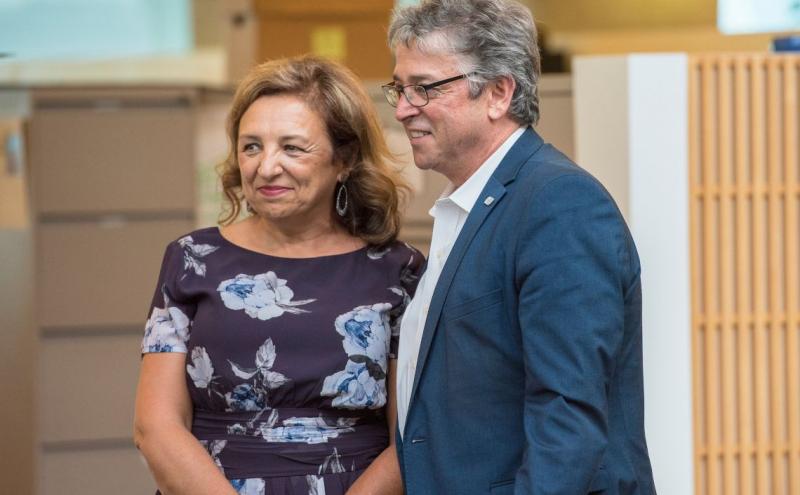
This blog post was written by a Pathfinder at Seattle-Tacoma International Airport (SEA).
October 21 was International Pronouns Day, a day with a mission to make respecting, sharing, and educating about personal pronouns commonplace. Although the actual day has passed, it’s still a good time as any to talk about the importance of pronouns.
I work as a Pathfinder at the airport. I help passengers navigate the airport, find their way around, and get them to where they need to be.
On the lanyard that holds my Port employee badge, I wear a button that displays my pronouns — She/Her/They/Them. This is my way of letting people know how they should refer to me. This is also my way to inform passengers, their family members, airport employees, and anyone that I interact with, that I am aware of and have sensitivity to the complex nature of gender identities.
The pronoun button is meant to describe you. It is meant to let people know how to address you in a way that corresponds with how you identify. It's a way to make people feel welcome and safe. Whether you’re cisgender, transgender, non-binary, two-spirit, or any other way you might identify, sharing your pronouns and asking people’s pronouns gives people another way to show up as their full selves.
For more than 10 years, I have worn pronouns button at work and on my backpack. I often receive compliments — “Hey! I like your pin!” or “That’s very cool!” — and questions — “What does that mean? or “Why do you wear it?” Wearing a pronoun button is a great way to start a conversation and engage people’s curiosity.
Several days ago, as I was working at the airport information desk, a passenger approached me and asked, “Where can I have an omelet?” While I was searching “omelet” on the SEA app, the passenger pointed to my pronoun button and said, “I like your pin! Where did you get it?” The desire for an omelet was put on hold.
We talked for several minutes about where I got the button, why I wear the button, and the importance of pronouns. She was very open to listening and learning, and I learned that this passenger uses the same pronouns that I use. So, I gave her my button. She immediately put it on her sweater, and I went back to trying to find out where she could get an omelet.
When the passenger went on her way, she looked so happy wearing her new button, and the encounter truly made my day. I hope that our conversation empowered her in some way to educate others and be sensitive to the importance of using someone’s desired pronouns.
It may not seem like a lot, but the language we use to refer to people is important. Just like we ask people what their name is, we should all get into the habit of asking others what pronouns they use. Asking people to share their pronouns helps to eliminate assumptions that we make about people, and it creates a space where people feel they are respected. Referring to people by the pronouns they determine for themselves is basic to human dignity. Being referred to by the wrong pronouns can be harmful, particularly for trans and gender-nonconforming people.
Wearing the pronoun pin has a message. Be authentic. Be proud. You define who you are, and you are one of a kind. And I support that.
At Seattle-Tacoma International Airport, we're here to help and to support travelers of every pronoun.








